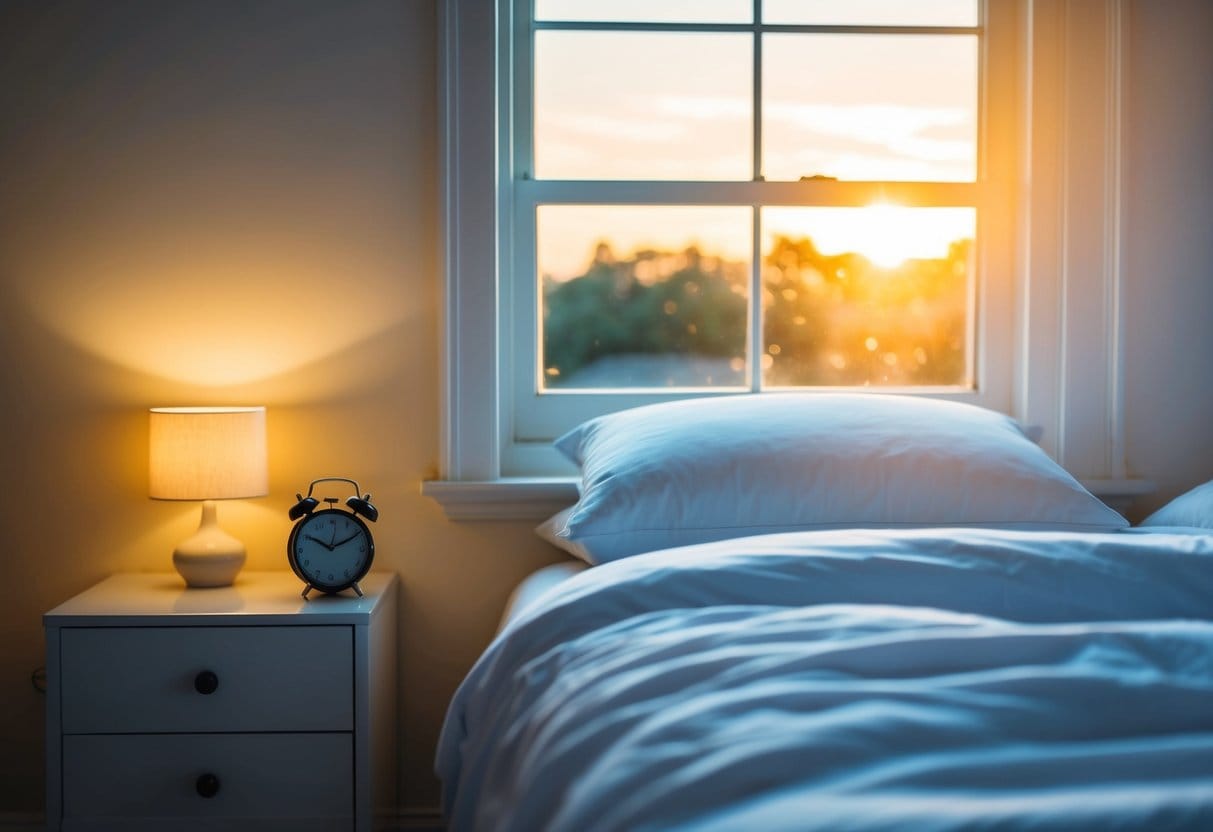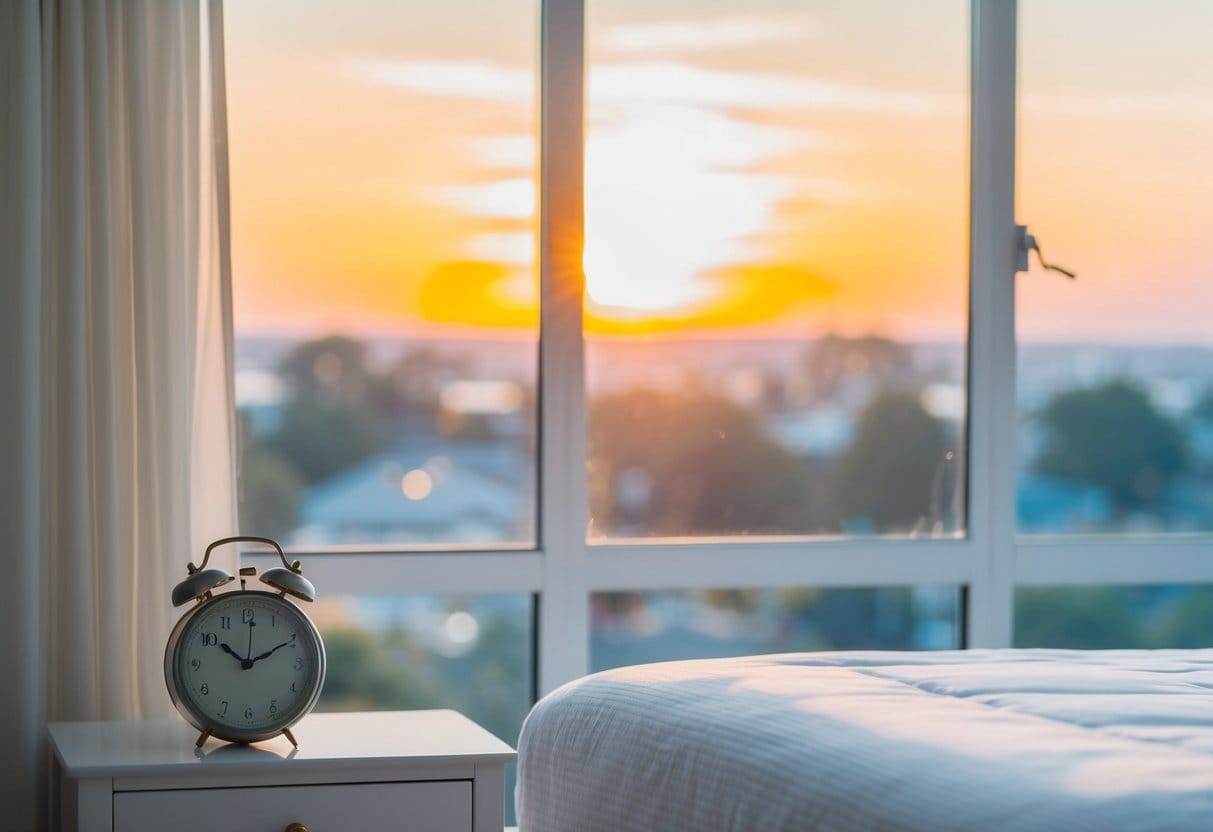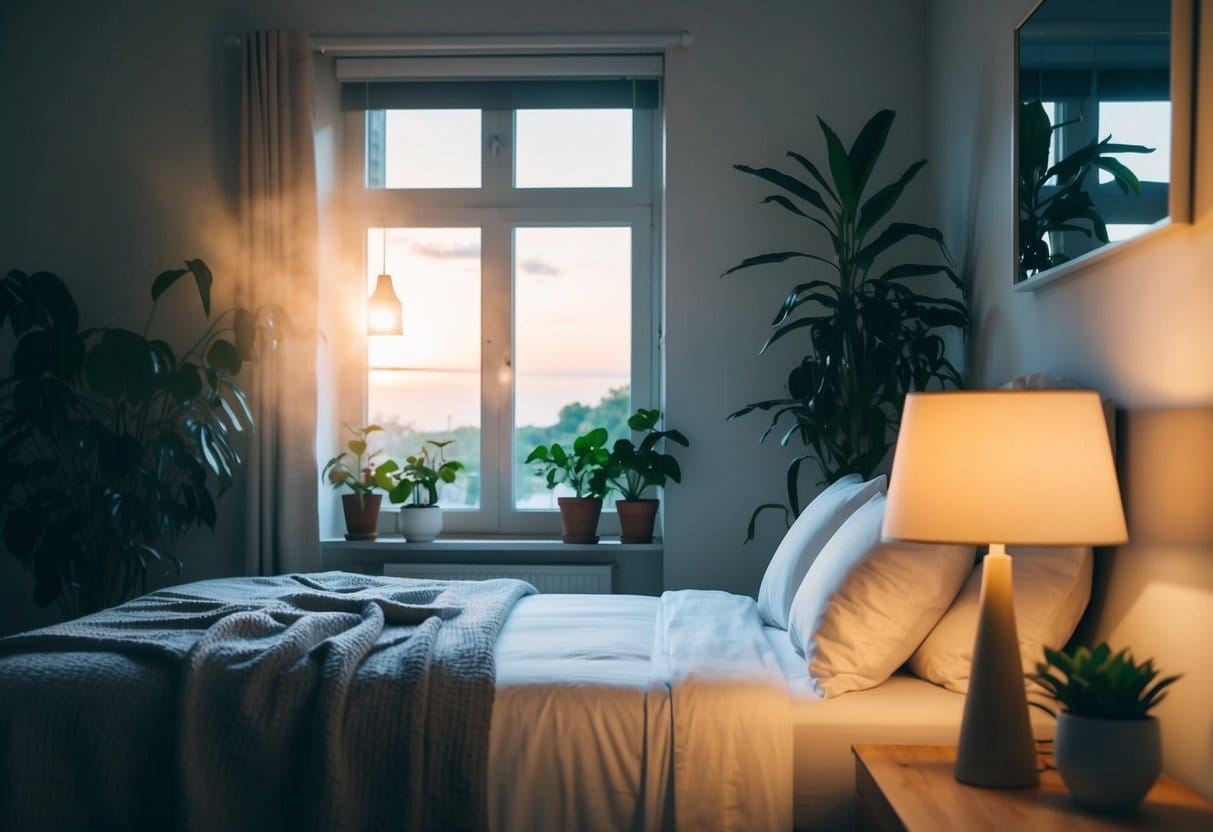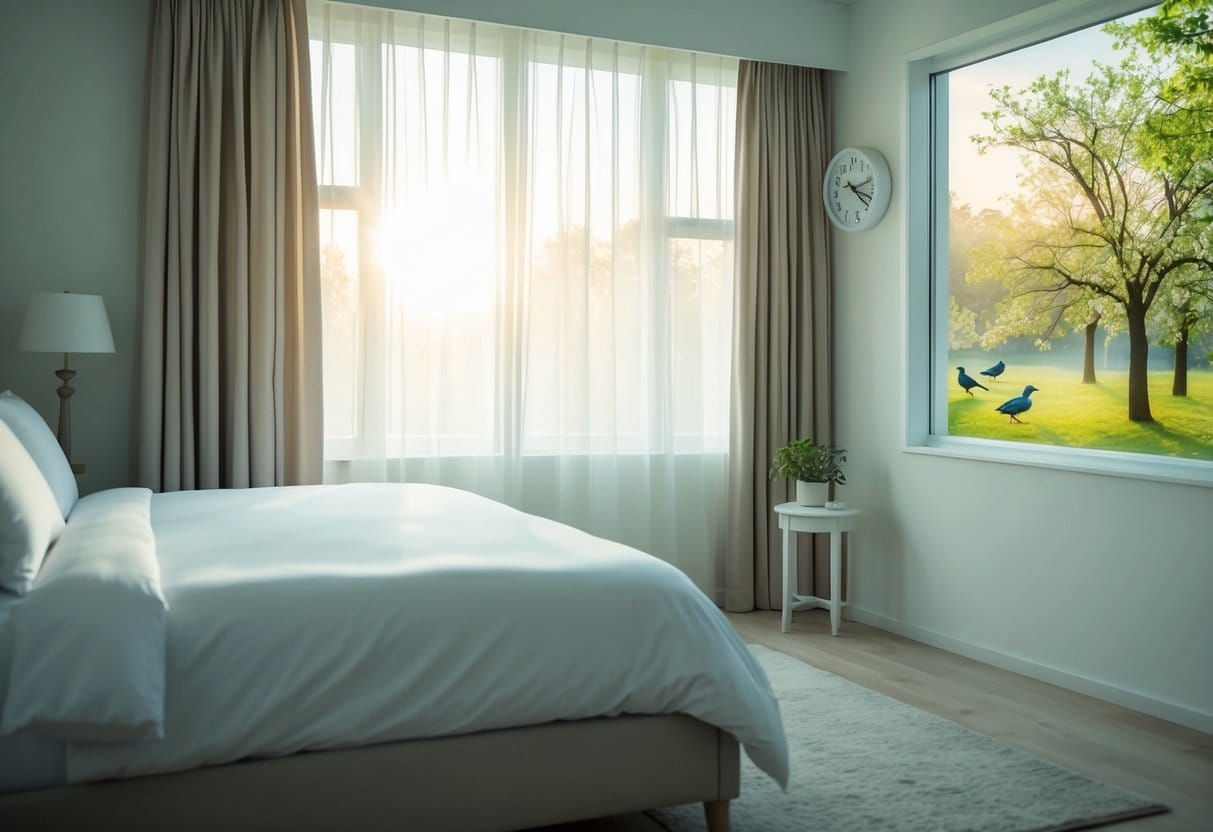Table of Contents
In a world that never sleeps, understanding and optimizing your sleep-wake cycle might be the key to improving your overall well-being.
The quality of your sleep impacts your physical, mental, and emotional health, making the synchronization of your circadian rhythm essential.
Strategies such as regulating light exposure and maintaining consistent meal times can effectively reset your internal clock.

Small lifestyle changes have the potential to align your sleep schedule with your natural circadian rhythm, leading to more restful nights.
Factors like diet, exercise, and even stress management play crucial roles in maintaining sleep quality.
With the right approach, these adjustments can transform your nightly rest and, consequently, your daily life.
Key Takeaways
- Regulate light and meal times to reset your circadian rhythm.
- Improve sleep by considering lifestyle and environmental factors.
- Align your sleep pattern with your natural rhythm for better health.
Understanding Circadian Rhythms

Circadian rhythms are vital 24-hour biological cycles that help regulate various physiological processes. They profoundly influence sleep patterns, hormone release, and other essential bodily functions.
The Role of the Biological Clock
Your internal clock, governed by structures in the brain such as the suprachiasmatic nucleus (SCN), is crucial for maintaining regular circadian rhythms.
This biological clock helps to synchronize body functions with the day-night cycle.
The SCN, located in the hypothalamus, receives direct input from light receptors in the eyes. This input adjusts the timing of the clock, ensuring it aligns with the environmental light-dark cycle.
When properly aligned, your body feels alert and energetic during the day, while promoting restful sleep at night.
Hormone Production and Release
Melatonin, a hormone closely tied to circadian rhythms, is produced by the pineal gland. Its release is typically stimulated by darkness.
Melatonin levels increase in the evening, promoting sleepiness, and decrease in the morning, allowing you to wake up.
Cortisol, another hormone influenced by circadian rhythms, peaks in the early morning to prepare you for a new day.
These hormonal changes are critical for regulating sleep-wake cycles and overall health.
Disruptions to your natural rhythms can lead to sleep disorders and impact long-term well-being.
Natural Sunlight and Circadian Regulation
Light exposure plays a critical role in regulating circadian rhythms.
Natural sunlight is a powerful cue that helps reset the internal clock.
Exposure to bright light in the morning and reduced light in the evening reinforces the natural rhythm.
Light suppresses melatonin production, keeping you awake and alert during the day.
An indoor lifestyle or excessive screen time can disrupt these signals, potentially leading to circadian misalignment.
Adjusting your environment to maximize natural light exposure during the day, while minimizing it in the evening, can enhance your circadian health.
The Impact of Sleep on Health

Adequate sleep is crucial for maintaining both mental and physical health. Disruptions in your sleep can lead to a cascade of negative health effects, impacting everything from mood to cardiovascular health.
Sleep and Mental Health
You might notice that on days when you don’t sleep well, your mental health takes a hit.
Quality sleep supports your brain’s ability to regulate emotions, manage stress, and process information effectively.
Insufficient sleep is linked to mood disorders, including depression and anxiety. Chronic sleep issues may exacerbate these conditions, creating a cycle that is difficult to break.
Sleep helps your brain clear out toxins that accumulate during the day, making you more mentally agile.
Sleep’s Role in Physical Health
Good sleep isn’t just about feeling energized; it’s essential for physical health.
Proper rest helps regulate hormones involved in hunger and metabolism, reducing your risk of obesity and diabetes.
When you sleep well, your body repairs tissues, builds muscle, and strengthens your immune system.
Sleep plays a key role in maintaining heart health, with poor sleep linked to cardiovascular diseases like hypertension.
Consequences of Sleep Deprivation
When you don’t get enough sleep, the consequences extend beyond feeling tired.
Sleep deprivation impacts coordination and cognitive function, leading to accidents and decreased productivity.
Long-term deprivation can lead to serious health issues, increasing your risk of obesity, diabetes, and heart disease.
Sleep deprivation also negatively impacts mental health, worsening conditions like anxiety and depression.
Prioritizing sleep helps to safeguard your overall well-being.
Optimizing Sleep Quality

Enhancing the quality of your sleep involves various strategies such as developing consistent sleep habits, maintaining optimal sleep hygiene, and addressing potential sleep disturbances. These steps aim to improve sleep architecture and promote restorative rest.
Developing Healthy Sleep Habits
Establish a consistent sleep schedule by going to bed and waking up at the same time every day, even on weekends.
Regularity reinforces your body’s circadian rhythm, ensuring you experience deep sleep and REM sleep, both crucial for cognitive function and overall health.
Create a relaxing bedtime routine that encourages sleep readiness. Activities like reading a book or engaging in light stretching help signal your body to wind down.
Limit screen time at least an hour before bed to avoid blue light exposure, which can interfere with melatonin production and delay sleep onset.
The Importance of Sleep Hygiene
Maintain a sleep-friendly environment to enhance sleep quality.
Invest in a comfortable mattress and pillows, and ensure your bedroom is dark, cool, and quiet. Consider using blackout curtains and a white noise machine if necessary.
Pay attention to stimuli and disruptions in the sleep environment. Keep electronics and clutter out of the bedroom to promote an atmosphere dedicated to rest.
Practice a balanced diet and regular exercise, but avoid heavy meals, caffeine, and strenuous workouts close to bedtime to support optimal restfulness.
Managing Sleep Disturbances
Identify and address any sleep disturbances that may impact your sleep quality.
Conditions such as insomnia, sleep apnea, or restless legs syndrome require proper management and sometimes medical intervention.
Consult a healthcare provider for persistent issues.
Explore relaxation techniques, such as deep breathing or progressive muscle relaxation, to reduce anxiety and improve sleep quality.
Light therapy in the morning can help reset your biological clock, promoting a healthier sleep-wake routine.
If needed, consider melatonin supplements, but consult with a healthcare professional beforehand to avoid potential side effects or interactions.
Diet and Its Effects on Sleep

Diet plays a crucial role in regulating sleep patterns. Certain foods can enhance the sleep quality, while others, like caffeine and alcohol, may disrupt it. Additionally, the timing of meals can influence how well you rest, affecting your circadian rhythm and digestion.
Foods That Promote Better Sleep
Eating the right foods can encourage better sleep.
High-fiber diets are linked to more restorative sleep, as they help with digestion and stabilize blood sugar levels.
Tryptophan-rich foods, such as turkey, nuts, and seeds, are known to increase the production of melatonin, a hormone that regulates sleep.
Complex carbohydrates like whole grains can improve sleep by encouraging the body’s serotonin production. Pairing them with foods high in magnesium, such as spinach or almonds, may further enhance their effectiveness.
Avoid large meals right before bed as they can cause discomfort and hinder sleep.
Caffeine, Alcohol, and Sleep
Caffeine, commonly found in coffee, tea, and energy drinks, can interfere with the sleep-wake cycle.
It’s a stimulant, keeping you alert by blocking sleep-inducing chemicals in the brain.
Consuming caffeine in the afternoon or evening can delay your sleep phase and reduce sleep quality.
Alcohol, although it may make you feel sleepy, actually disrupts the sleep cycle. It can lead to fragmented sleep and interfere with the REM stage, which is vital for cognitive function.
Reducing or avoiding these substances in the hours leading up to bedtime can promote better rest.
Timing of Meals and Sleep Quality
The timing of your meals significantly impacts sleep.
Eating late at night can disrupt your digestion and sleep cycle.
It’s advisable to have your last meal 2-3 hours before bedtime to allow your body to properly digest food.
Keeping a regular eating schedule supports the body’s natural sleep-wake cycle.
Consistent meal timing helps in aligning your internal clock, synchronizing with melatonin production.
Avoid heavy or spicy foods late at night, as they may cause discomfort and hinder your ability to fall asleep easily.
Lifestyle and Environmental Factors

Optimizing your circadian rhythm involves making strategic lifestyle choices and adjusting your environment to promote better sleep patterns. Understanding the role of exercise, managing light exposure, and creating a restful environment can have a significant impact.
Exercise’s Effect on Sleep
Regular physical activity can enhance the quality of your sleep.
Aim for at least 30 minutes of moderate aerobic exercise most days, if possible.
Exercise can help regulate your sleep-wake cycle by reducing the time it takes to fall asleep and by increasing sleep duration and deep sleep stages.
Avoid vigorous workouts close to bedtime as they may lead to increased alertness.
For shift workers, synchronizing exercise with your intended wake time can aid in circadian alignment.
Introducing a consistent exercise routine can promote more restorative sleep and daytime alertness.
Managing Light and Electronics
Light plays a crucial role in regulating your body’s internal clock.
Natural sunlight exposure, especially in the morning, helps reinforce your circadian rhythm. This exposure should ideally last for 20-30 minutes.
In contrast, limit your exposure to artificial light in the evening.
Evening screen time can delay your sleep cycle due to the blue light emitted from devices. Consider using blue light filters or glasses to mitigate this effect.
For those experiencing jet lag, controlled light exposure can aid in faster adaptation to new time zones.
Creating a darker environment as bedtime approaches can also enhance sleep quality.
Advanced Strategies for Sleep Regulation
Adjusting your sleep cycle can significantly impact your energy levels and productivity throughout the day. Employing techniques like strategic naps, phase shifting, and specific therapies can reset and optimize your circadian clock effectively.
Utilizing Strategic Naps
Strategic naps are beneficial for enhancing productivity and maintaining energy levels.
Aim for naps of about 10 to 30 minutes during the early afternoon when the body’s energy dip naturally occurs.
Short naps prevent sleep inertia, a state of grogginess that happens after longer naps.
To maximize benefits, find a quiet, dark place to rest and consider wearing an eye mask or using white-noise machines.
Tip: Consistency in nap timing can help regulate your circadian rhythm and improve overall sleep quality.
Phase Shifting Techniques
Phase shifting involves altering your sleep-wake schedule to better align with your natural circadian rhythm. This can be done through phase advance or phase delay.
Phase Advance: Going to bed and waking up earlier can help in situations like preparing for an early work shift.
Phase Delay: Staying awake and waking up later is useful for adjusting to night shifts or recovering from jet lag.
Make changes gradually, adjusting bedtime and rise time in small increments. Light exposure in the morning or evening can reinforce these adjustments.
Therapies for Circadian Rhythm Disorders
Therapies like light therapy and the use of supplemental melatonin have shown promise in treating circadian rhythm disorders.
Light therapy involves exposure to bright light at specific times to help recalibrate the sleep-wake cycle.
Melatonin supplements are effective in signaling to your body that it is time for sleep, particularly for conditions like delayed sleep phase syndrome.
It is essential to consult a healthcare professional before starting any therapy to ensure it suits your individual needs.
These therapies, used strategically, can help stabilize sleep patterns and reduce disruptions.
Navigating Life’s Changes and Sleep
Life changes can significantly impact your sleep.
Adjusting your sleep patterns amidst transitions, such as aging or new parenthood, is vital. Understanding these effects can help you manage sleep debt and improve sleep quality during various life stages and events.
Adapting to Life Transitions
Changes like moving to a new city, starting a new job, or altering daily routines can disrupt your sleep phase.
Such transitions often require you to adapt your sleep schedule to align with new demands.
Exposure to natural light early in the morning can help reset your internal clock.
Creating a consistent bedtime routine supports regular sleep patterns and minimizes sleep disruptions.
Adjusting meal times to signal a new daily rhythm can also facilitate the adaptation process.
The Effect of Aging on Sleep Patterns
As you age, your circadian rhythm might shift.
Older adults often experience an earlier sleep phase, leading to waking up earlier. This change can alter your sleep-wake cycle, reducing total sleep duration.
Such shifts may involve lighter sleep stages and increased awakenings at night.
Increasing daytime light exposure and engaging in physical activities can help improve sleep efficiency.
Attending to sleep hygiene, such as minimizing caffeine in the afternoon, is crucial. Feeling rested upon waking often requires intentional management of these age-related adjustments.
Coping with Sleep Challenges of Parenthood
Parenthood introduces unique sleep challenges.
Caring for infants often demands nighttime feedings, which can affect your sleep debt. Sleep fragmentation is common, as irregular sleep patterns develop.
To manage these changes, nap when your child naps, if possible.
Sharing nighttime responsibilities can provide each parent with breaks. Prioritizing sleep when your schedule allows is key.
Tools like white noise and blackout curtains may enhance sleep quality. Balancing self-care with parenting demands is essential for maintaining health and well-being.
Frequently Asked Questions
Optimizing your circadian rhythm involves strategic adjustments to light exposure, meal timing, and activity levels. Understanding how these elements interact can aid in resetting your sleep-wake cycle.
How can I quickly adjust my circadian rhythm to a new sleeping pattern?
To quickly adapt, expose yourself to natural light in the morning and limit artificial light exposure at night.
Maintain a consistent sleep schedule by going to bed and waking up at the same time daily.
What is the impact of disrupted circadian rhythms on overall health?
Disruptions can lead to various health issues, including mood disorders, weight gain, and metabolic problems.
Chronic misalignment is associated with increased risks for conditions like diabetes and cardiovascular diseases.
Can a sleep cycle be effectively reset in a single night, and if so, how?
Though challenging, you can make significant adjustments in one night by manipulating light exposure and sleep timing.
Use bright light in the morning and avoid screens before bed to encourage a timely sleep onset.
What role does melatonin play in resetting the circadian rhythm?
Melatonin is a hormone that signals the body to prepare for sleep.
It can be taken as a supplement to help regulate sleep-wake cycles, particularly when adjusting to new time zones or schedules.
What are the steps to correct my sleep schedule within 24 hours?
Start your day with exposure to natural sunlight and follow it with consistent meal and exercise routines.
Avoid naps and limit caffeine intake to keep your body alert until the appropriate bedtime.
Which brain structure is primarily responsible for controlling the circadian rhythm?
The suprachiasmatic nucleus (SCN) in the hypothalamus is the primary brain structure managing circadian rhythms.
It synchronizes body functions with the day-night cycle by responding to light cues.
Ready to reset your sleep-wake cycle and master your circadian rhythm?
Explore these resources:
- “Why We Sleep: Unlocking the Power of Sleep and Dreams” by Matthew Walker: A definitive and comprehensive scientific look at why sleep is essential and how to optimize it.
- “The Sleep Revolution: Transforming Your Life, One Night at a Time” by Arianna Huffington: Focuses on the importance of sleep for well-being and productivity, and practical ways to prioritize it.
- “Change Your Schedule, Change Your Life: How to Harness the Power of the Body’s Circadian Rhythms to Do Your Best Work, Prevent Disease, and Stay Healthy” by Suhas Kshirsagar: Offers practical advice for aligning with your circadian rhythm.
- “Internal Time: Chronotypes, Social Jet Lag, and Why You’ll Always Be Too Busy” by Till Roenneberg: Delves into chronotypes (e.g., larks vs. owls) and their impact on daily life.




